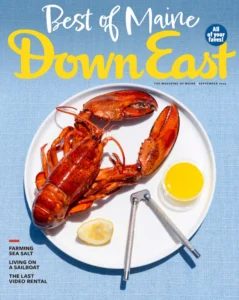 Murray Plumb & Murray
Murray Plumb & Murray Adam Nordell and Johanna Davis founded Songbird Farm in 2011 with a desire to make a living working outdoors. Like all small farmers, they also hoped to produce fresh, healthy food to nourish their community. In 2014, after leasing land for three years, the couple moved operations to a parcel they viewed as their forever farm: a 41-acre turnkey operation whose owner was dying of pancreatic cancer. With help from Maine Farmland Trust (MFT), which bought an agricultural easement on the property, Nordell and Davis were able to meet the purchase price and fulfill the previous-owner’s dying wish that the property remain a farm.
Then, in 2021, a regular customer of Nordell and Davis’s saw the Maine Department of Environmental Protection’s (DEP) map of fields treated with fertilizers containing PFAS chemicals and realized the couple’s land might be affected. Nordell and Davis opted to have their water, soil, and crops tested by a private company — one of the first farms in Maine to do so voluntarily — and were devastated to learn that PFAS chemicals were present in all of their soil and a portion of their crops. “We closed down the whole farm,” Nordell says. “It’s been pretty terrible.”
Along with losing their home and their livelihood, the couple is now hyperaware of their personal exposure to the chemicals and the current understanding that PFAS can accumulate in the body over time. “The farmer who lived there before us died of a fast-acting cancer that has been linked to PFAS exposure in DuPont studies,” Nordell says. “We can’t get the chemicals out of our bodies.”
The family hoped to sell the land to MFT, who could transform it into an on-farm research site to identify long-term solutions to the PFAS problem. Upon hearing the couple’s desire to negotiate a sale, MFT introduced them to the Legal Food Hub, an organization that connects food-related businesses with pro bono and “low bono” legal services. Songbird Farm was matched with the Portland law firm Murray Plumb & Murray, now celebrating 50 years in business. “The pro bono matters that we take on are not just important to one individual,” says Elizabeth Boepple, the lawyer who supported Nordell and Davis in selling their property to MFT. “Like this case, with the increased statewide concern around PFAS, it’s usually something that’s critical to everybody in Maine.”
That belief is what guided Murray Plumb & Murray’s founding partners to seek a better way to serve than what was modeled by larger practices at the time. Since 1973, supporting clients and communities has been at the heart of the firm’s ethos, a commitment reflected in its ongoing dedication to projects providing immigrants with access to health care, championing arts organizations, and protecting the places that make Maine so special. The firm achieves this support through hundreds of pro bono and low bono cases, along with donations and volunteer hours. “I joined Murray Plumb & Murray because, since its founding, it has been part of the firm’s DNA to not only assist our clients with each immediate deal, crisis, or court case, but also to work in concert with our clients to strengthen, sustain, and contribute to our community, both here in Portland and across Maine,” says Sage Friedman, an attorney with the firm since 2017. In addition to the important work with Legal Food Hub, Murray Plumb & Murray’s attorneys advocate for improved access to legal services through the Campaign for Justice, ACLU, and Disability Rights Maine.
Nordell and Davis are hopeful that with the sale finalized, they can move on with their lives. For now, Nordell offers a piece of advice. “Young farmers should find a lawyer that they trust,” he says. “Hopefully you never need their services, but you never know. You really never know.”



